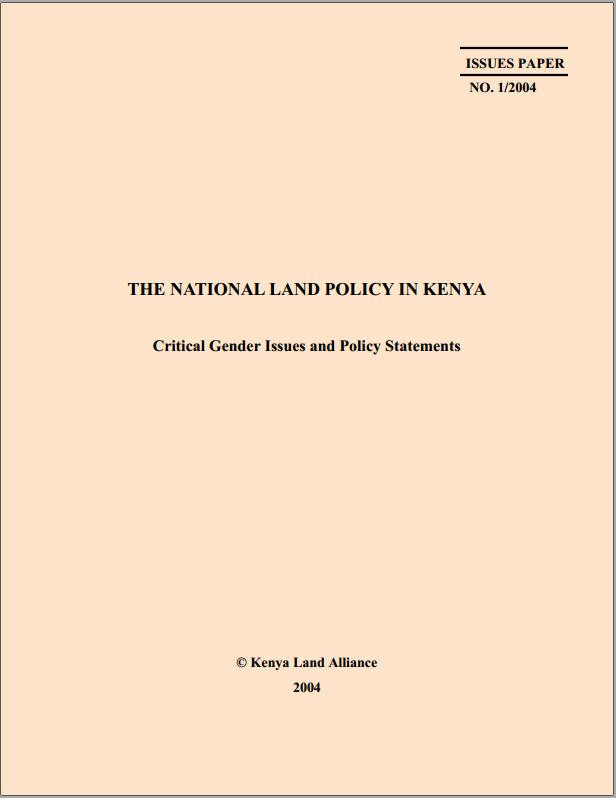Goats under household conditions
Goats account for about 30% of Africa’s ruminant livestock and produce about 17 and 12% of its meat and milk, respectively. Sub-Saharan Africa (SSA) accounts for over 60% of the total goat population in Africa, with an estimated 147 million goats representing about 80 indigenous breeds or strains distributed across all agro-ecological zones and ruminant livestock production systems. Goats are particularly important in marginal agricultural land areas, especially in arid and semi-arid areas, which together hold 64% of the goat population.
Land, Conflict and Livelihoods in the Great Lakes Region: Testing Policies to the Limit
Covers (1) Land as a source of conflict in Africa – the multi-dimensional nature of land issues; indirect causes of conflict, land access and structural poverty; interactions between customary and state-managed tenure systems; historical injustices and land disputes. (2) Land rights during conflict – population displacement; land as a sustaining factor in conflict; land rights of women, children and marginalized communities.
Report on FAO, UNIFEM and National AIDS Council Joint National Workshop on HIV and AIDS, Women’s Property Rights and Livelihoods in Zimbabwe
Report divided into 5 sections: inheritance and property rights; disability rights, HIV & AIDS, women’s property rights and livelihoods; survival strategies, nutrition, psychosocial support, economic empowerment, and self-reliance; self-reliance and economic empowerment for women in the context of HIV and AIDS; inspiring initiatives from the region (Zambia, Uganda, and Kenya). Contains a number of personal testimonies. Launched the famous T-shirt: ’property and a piece of land give women peace of mind’.
Multiple means of access to land for urban agriculture : a case study of farmers' groups in Bamako, Mali
Urban Land Market In Mozambique
This study was requested by the Ministry for Coordination of Environmental Affairs (MICOA), through the National Directorate of Territorial Planning (DINAPOT) in conjunction with the United Nations Human Settlements Programme (UN-HABITAT); for this purpose, the team of the Cruzeiro do Sul – Research Institute for Development counted with the participation of a group of students of the Master degree course in agricultural development at the Faculty of Agronomy and Forestry Engineering (FAEF) of the Eduardo Mondlane University (UEM).
Women’s Land Access in Post-Conflict Rwanda: Bridging the Gap between Customary Land Law and Pending Land Legislation
Contains sections on the effects on women of Rwanda’s civil war, the legal system, the gap between customary law and land legislation, research findings about Rwandan women’s rights, a number of dispute case studies, including methods of dispute settlement. Argues that a gap exists between customary and modern legal systems, creating both land access opportunities and constraints for women. Demonstrates the creativity with which women are bridging that gap in a state of legal uncertainty.
Zambia Land Alliance Submission to Constitutional Review Commission
A series of submissions by the Zambia Land Alliance on these topics: land as a right; women’s rights to land; vestment and administration of land; conversion of customary land to leasehold tenure; land and the environment; land information; mode of adoption of the Constitution.
Land Reform and Human Rights in Contemporary Zimbabwe: Balancing Individual and Social Justice through an Integrated Human Rights Framework
Land distribution and access to land are key issues in Zimbabwe. In recent years, nearly all of the country's commercial farm land has been re-designated, leaving most farm workers dislocated from their farm villages. The government of Zimbabwe argues that the land reform programme is needed to achieve historical and social justice. However, this article concludes that the government is engaged in serious human rights violations and is appropriating land to distribute to its followers for political not social justice ends.
Gender and the Land Reform Process in Uganda: Assessing Gains and Losses for Women in Uganda
Land in Uganda is the core factor of production and one of the three basic resources, next to people and time. Women’s struggle for gender balance with particular regard to land is a direct result of the fact that their central role in economic development has not been recognised; tradition and customs (such as polygamy, bride wealth and succession) have deprived them of actual ownership of land.
The National Land Policy in Kenya Critical Gender Issues and Policy Statements
The purpose of this Issues Paper is to move the debate and stimulate discussion of issues relevant to women’s land rights and social security beyond the unfulfilled demands for gender responsive land policies and land legal framework. It is based on lessons learned from various research findings, Kenya Land Alliance experience and discussions with colleagues with whom we work with in various capacities on land policy and law reforms in Kenya and others parts of Africa.
Widows, AIDS, Health and Human Rights in Africa
This paper argues that widows and female children in Tanzania have traditionally been denied the right to inherit property from their husbands, even when the property was acquired during the marriage. This is further complicated by a three-part legal system consisting of customary law (law grounded in customs or traditions), Islamic law, and statutory law (law set down by a legislature). As a result, Tanzanian women and their children are often left homeless upon the death of their husbands.






